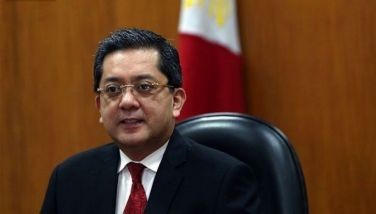Sin tax bill signed into law
MANILA, Philippines - President Aquino signed yesterday the sin tax reform bill into law, paving the way for higher cigarette and liquor prices in the coming weeks.
After signing Republic Act No. 10351, Aquino thanked lawmakers who fought to have it passed amid strong lobby against the measure from what he described as groups “with deep pockets.”
“Many believed it was impossible to pass the sin tax bill” as those blocking its passage were “strong, noisy, organized,” the President said.
But he said it was ultimately hard work and unity that prevailed and made the day for the sin tax measure.
“Today, we sign, finally, a law that serves as an early Christmas gift to millions of Filipinos who will be covered by the universal health care program, who will benefit from new public clinics and hospitals that will be built, and who will be discouraged from smoking and drinking,” the President said in his speech during the signing ceremony at Malacañang.
“We have proven: nothing is impossible for Filipinos who are sailing in the same direction, whose hearts are in the right place, and who are ready to fight for their principles,” he said.
In its first year of implementation, the measure is expected to generate for the government additional revenues worth P33.96 billion, of which P23.4 billion will come from cigarettes, P6.06 billion from distilled spirits and P4.5 billion from fermented liquors.
The sin tax bill had been pending in Congress since 1997 and the President said many had thought it would already be impossible to have it passed due to conflicting interests.
The bill will significantly increase the prices of cigarettes and liquor in the country. The prices of sin products in the Philippines are significantly lower than those in other countries.
Contrary to claims by lobby groups, Aquino said tobacco farmers would benefit from the measure in terms of assistance and access to alternative livelihood.
The President thanked Senate President Juan Ponce Enrile for showing respect for the passage of the measure despite his being against it.
He also praised Speaker Feliciano Belmonte Jr. and Sen. Franklin Drilon for their efforts in ensuring the bill’s passage.
Aquino said Finance Secretary Cesar Purisima, Health Secretary Enrique Ona and Bureau of Internal Revenue Commissioner Kim Henares should also be credited for convincing lawmakers to consider the measure. He called Henares the “lead fighter in the trenches for this endeavor.”
Aquino said that based on the enacted measure, “taxes will be uniform and will open the doors for healthy competition in the industry and avoid monopoly.”
Eighty percent of the incremental revenues after deducting the support for tobacco farmers under RA 7171 will be allocated for universal health care under the National Health Insurance Program, and 20 percent will be allocated nationwide for medical assistance and health enhancement facilities program.
Under the sin tax law, the proper tax classification of alcohol and tobacco products will be determined every two years, removing the price/brand classification freeze.
This is meant to simplify the current multi-tiered structure to prevent downshifting to lower priced brands.
To prevent the excise taxes from getting eroded by inflation, the excise tax rates will be increased by four percent every year effective 2016 for distilled spirits and 2018 for cigarettes and beer.
Officials said the law conformed to the World Trade Organization ruling on distilled spirits and tobacco.
Drilon leaves chairmanship
Drilon, meanwhile, has given up his role as acting chairman of the Senate committee on ways and means after helping ensure passage of the sin tax reform measure.
Sen. Ralph Recto reassumes the chairmanship of the committee.
Drilon took over the chairmanship of the committee from Recto last October after the latter decided to give it up in response to allegations that he was defending manufacturers of cigarettes and alcohol.
Recto decried what he thought was lack of support from finance officials for his version of the sin tax bill.
He had been pilloried by various sectors for pushing for lower tax rates for cigarette and liquor.
Apart from the sin tax bill, Drilon also sponsored the bill removing the common carriers tax on foreign airlines and marine vessels.
“These two important measures, I believe, is a major work that the committee on ways and means undertook for the past two months. Having said that, we believe it is time that we relinquish the acting chair as the only purpose of our having assumed the acting chair is to work first on the sin tax reform measure and second, on this long-pending common carriers tax,” Drilon said.
Sen. Ferdinand Marcos Jr., for his part, insisted that the sin tax reform measure will promote smuggling of tobacco in the country. He said the government is unlikely to realize its revenue target.
Tobacco farmers belonging to the Philtobacco Growers Association (PTGA) also expressed disappointment over the passage of the measure.
“We are in mourning because this is the beginning of the demise of the tobacco industry in the country,” said PTGA president Saturnino Distor.
The group believes the excise tax law favors imported brands.
‘Game changer’
For Health Secretary Enrique Ona, the Sin Tax Reform Law is a “game changer” that will drastically alter the landscape of the country’s health care system.
“The enactment of this law is a victory in our campaign to protect our people, especially the young and the poor, from the ill effects of smoking and excessive drinking,” Ona said in a statement in reaction to President Aquino’s signing the measure into law.
Ona added that by increasing the prices of cigarettes, “the number of young and poor people smoking and drinking excessively will be reduced significantly.”
This in turn, he said, will result in “lower incidence of smoking related non-communicable illnesses such as lung cancer, heart attack, strokes and chronic lung disease, as well as diseases associated with excessive drinking such as liver diseases and trauma secondary to drunk driving.”
Part of the revenues from tobacco and alcohol products will be used to enroll into Philippine Health Insurance Corp. (Philhealth) the poorest 20 percent of the country’s population and upgrade and modernize hospitals and other healthcare facilities, among others.
“The Department of Health is grateful for the invaluable dedication of Sen. Franklin Drilon, acting chair of the Senate committee on ways and means, and Representative Isidro Ungab, chair of the House committee on ways and means and bill sponsor in their respective chambers, in ensuring that this critical health measure is passed,” Ona said.
“We also recognize the support of our health champions in the Senate and the House of Representatives as well as the Department of Finance, Bureau of Internal Revenue and our partners in the academe, medical societies, patients’ groups and other members of civil society,” he said.
Based on DOF projections, the law is estimated to generate cumulative incremental revenue of P184.31 billion from 2013 to 2016, of which P146.7 billion is estimated to be earmarked for health. With Sheila Crisostomo, Marvin Sy, Christina Mendez
- Latest
- Trending



























